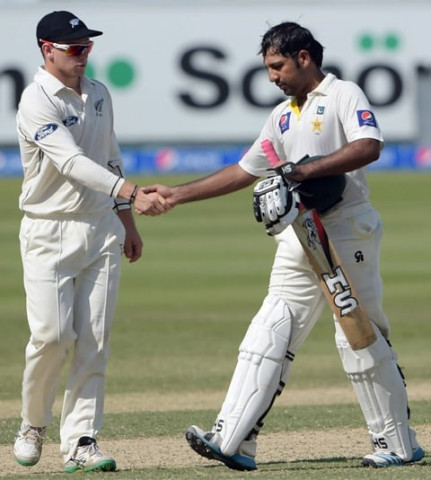Comment: Pakistan, New Zealand put boring theory to the Test
Not since the start of the first Test against Australia had the hosts been made to work hard

Comment: Pakistan, New Zealand put boring theory to the Test
Not since the start of the first Test against Australia, when the openers were dismissed early, had the hosts been made to work hard. Three Tests and more than 85 hours of Pakistan toying with their opponents; their batsman breaking record after record and their bowlers – spinners and seamers alike – making a mockery of the pitches’ ‘dead’ tags.
Pakistan’s aggregate score in the six innings was 2344-26 at an average of 90.15 per wicket; for their opponents, it was 1519-60 at an average of 25.32. It may have been incredible cricket by Pakistan but for the viewers, even those supporting the sub-continent side, it was all getting a little too predictable, even mundane.
At a glance, the second Test ended in a draw but to those paying attention, this was one of the best advertisement of five-day cricket for a while. The cynics would say it started with McCullum winning the toss but there was much more to these five days than just the flipping of a coin.
Latham and McCullum showed steel that had been missing in Kiwi openers for some time, adding 77 before the skipper threw away his wicket as he pulled Ehsan Adil straight down midwicket’s throat. Kane Williamson and Ross Taylor were unable to improve on their starts but by the time day one finished on 243-3, the gauntlet was laid down by the visitors. The message was clear; no more easy wins, no more having everything their way, Pakistan would have to dig deep.
For their part, the bowlers bowled some probing lines and got a few edges, with the ball that went through Williamson’s defences being an especially unplayable one by Zulfiqar Babar.
Pakistan hit back early on day two to dismiss the overnight batsmen, Latham and Corey Anderson, within two runs of day one’s score. It seemed the bowlers would roll over the tail but New Zealand defied the hosts yet again, making it past 400.
In reply to 403, Pakistan lost openers Taufeeq Umar and Shan Masood before stumps on day two and at 34-2, the hosts were decidedly second-best and suddenly scrambling to save the Test.
Azhar Ali and Younus Khan played their — by now customary — bailing out role, adding yet another hundred-run partnership but just when the duo looked to give Pakistan the upper hand as they had done in the last Test at Dubai, Younus threw it away, cutting a rank James Neesham long hop to short extra cover. The ball was so poor that Neesham barely celebrated after getting the all-important wicket.
Out came Misbahul Haq, with three consecutive centuries to his name, and it was clear it would need something special to get him out. Trent Boult duly obliged. After bringing a few balls back in, the left-armer got one to go away and Misbah could only nick it to first slip.
Azhar Ali was dismissed by Ish Sodhi but Asad Shafiq and Sarfraz Ahmed’s good work late on once again seemed to be getting Pakistan in the clear. However, Shafiq, like Younus, threw it away when he chased a ball wide outside off and edged it to the keeper to leave Sarfraz with the tail.
But just when New Zealand threatened to run away with the match after taking three quick wickets on day four, there was yet another twist. Sarfraz’s incredible century, and 81-run last-wicket stand with Rahat Ali meant that the Kiwis only had a 10-run first-innings lead.
With the ball spinning and swinging precariously by now, there was all to play for and the spinners quickly took six to leave New Zealand 167-6 at stumps on day four, with Brendon-John Watling, Neesham and Anderson being on the wrong end of unplayable deliveries.
Taylor, like Sarfraz before him, stood defiant though and also like Sarfraz reached his century before being dismissed. Tim Southee then promptly hit Babar for three consecutive sixes before holing out at cover to make it 250-9. McCullum, chasing a series-equalling win, made the bold decision to declare, despite more than 60 overs remaining in the day.
Taufeeq was dismissed early on before Azhar yet again came to Pakistan’s rescue. At 70-1 and needing just under five-an-over, it seemed that Pakistan would pull off a heist after playing catch-up for more than three days. But there were still some twists left, Azhar drove Mark Craig’s full toss straight to cover when he could have hit it anywhere in the park.
Three runs later, Boult’s fierce yorker hit Masood on the back leg and even a review could not save him. Two runs after that, Boult bowled an even better delivery to Misbah to dismiss him for the second time in the match. The ball came in with the angle, forcing Misbah into the shot but reversed away from him at the last moment and Pakistan’s skipper could do nothing but edge it behind. From 70-1 and on top, Pakistan were suddenly 75-4 and once again fighting to save the Test.
Younus then steadied the ship with Asad Shafiq but received a brute of a delivery from Craig that jumped off the rough to hit him on the glove and into the hand of first slip. Sarfraz then came on to make an enterprising 24 off 23 but it was too little too late as the match ended in a draw.
However, all three results had looked likely till the final session and all the things that make Test cricket the spectacle that it is were on display. Probing bowling on a poor pitch on day one, gutsy batting on a fast deteriorating track later on, incredible deliveries that produced deserving dismissals and just as incredible shots in defiant innings, twists and turns as tail-enders made runs and part-timers such as Azhar and McCullum dismissed set batsmen; this match had everything good in it.
But it also had all the bad that makes this format just as compelling; dropped catches, poor keeping, overthrows, rash shots and poor deliveries to name a few.
Perhaps then it is fitting that the match ended in a draw as neither team deserved to lose, but those claiming that Test matches – especially those that end in draws – are boring, have 30 hours of cricket that prove them decidedly wrong.
Like Sports on Facebook, follow @ETribuneSports on Twitter to stay informed and join in the conversation.



















COMMENTS
Comments are moderated and generally will be posted if they are on-topic and not abusive.
For more information, please see our Comments FAQ